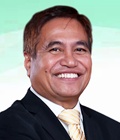Love,
education and poverty
(Valentine ruminations)
 By
JAIME ARISTOTLE B. ALIP, Ph.D.
By
JAIME ARISTOTLE B. ALIP, Ph.D.
February 12, 2022
There are many reasons to
celebrate this month. February 1 marks the Lunar New Year, also
known as Chinese New Year, which will be celebrated across the world
until February 15. Omicron may have given us an inauspicious start
in January, but I am so glad that we are kicking off the Year of the
Water Tiger with news that COVID-19 cases are declining nationwide.
February 14, of course, is
Valentine’s Day. Many lucky couples will celebrate this holiday with
love, flowers and chocolates. My wife and I will make do with our
usual morning tête-à-tête over kapeng barako and pandesal, our
weathered hearts full of celebrations past. With our kids and apos,
the love of friends and colleagues who are like extended family to
us, every day feels like Valentine’s. And we are grateful for that.
I am also praying that the
IATF will brighten our hearts on February 14, when it announces the
updated alert levels as it continues to monitor existing
restrictions in light of the decline in COVID-19 infections. The
Philippines is now back to moderate risk status, an improvement from
the previous high and critical risk classification. I hope that we
can all look forward to the reopening of the economy. Let us show
our love for others by following health safety standards like
frequent handwashing, observing physical distance, and wearing of
face masks.
There is another reason to
celebrate February 14. It is the 21st anniversary of the CARD-MRI
Development Institute (CMDI), a globally-recognized learning
institution grown from our humble corner of the world, the scenic
province of Laguna. How CMDI came about is also a love story, hewn
from our decades of rural development work with the marginalized
sectors.
CMDI began as the training
unit for personnel of the Center for Agriculture and Rural
Development (CARD), a non-government organization, which provides
microfinance and related services to poor women. As CARD grew into
several mutually-reinforcing institutions (MRIs) in response to the
needs of our expanding clientele, our capacity-building needs also
became more complex. We were rather naïve when we started CARD in
1986. Full of idealism, armed with limited funds and boundless hope,
we thought we only needed to provide microcredit to transform the
lives of our clients. But things were not that simple.
You see, poverty has many
roots, and lack of education is one of them. Working directly with
the poor --especially those in the rural areas -- we saw this
firsthand. Our clients suffer many forms of deprivation and their
needs go beyond microfinance. Providing them with funds for
livelihood is good, yes, but more is needed: financial literacy,
training in microenterprises, marketing support, microinsurance, and
a host of other things.
Thus, we established the
CARD Training Center in 2000 in Barangay Tranca, Bay, Laguna. In
there, we trained not just our staff, but our clients. Later on,
other organizations also approached us for their training needs. And
this is how our training unit evolved into the CMDI: a learning
resources network that provides an array of practitioner-led
training and education services to our staff and members, as well as
other microfinance practitioners seeking advanced education in
applied microfinance. It is now a government-recognized educational
institution with facilities in Baguio, Pasay, and Masbate, as well
as a campus in Tagum, Davao.
Nelson Mandela once said
that “Education is the most powerful weapon we can use to change the
world.” The story of CMDI certainly proves this truth. As of
December 2021, CMDI has trained 1,570,848 clients under its Credit
with Education (CwE) program. Imagine the multiplier effect that
more than a million individuals trained on health, business,
microinsurance, disaster preparedness, and credit discipline could
have on their communities. The impact of these trainings had been
felt not just by our clients and their families. Through many
disasters and emergencies, our clients have become community
leaders, sharing with others what they have learned from us.
To help break the
inter-generational cycle of poverty, CMDI now offers affordable
education to clients and their children. It offers Senior High
School, TESDA-accredited courses and baccalaureate programs. CMDI
has granted more than 15,000 educational scholarships to poor and
deserving students.
Why focus on education?
Education is crucial
because it directly correlates with many solutions to poverty,
including economic growth and reduced income inequality. It is also
the highest aspirations of our clients: that their children get an
education. To poor parents, sending their children to school is the
greatest act of love.
Many Filipinos lack access
to education. According to DepEd, more than 3 million were not able
to enroll last year, while the latest PSA data (2017) show that we
have 3.53 million out-of-school youth, half of them from families
whose income fall within the bottom 30 percent of the population.
Based on PSA’s 2018 Multidimensional Poverty Index (MPI), which
serves to complement the income-based measure of poverty, indicators
on educational attainment consistently had the highest incidence of
deprivation among Filipino families.
CMDI, then, is our humble
contribution to filling this educational gap. Providing training to
clients empowers and enables them to change their lives. We provide
affordable quality education to help our clients realize their dream
of securing their children’s future. It is also an act of love on
our part.
And because February is
the month of love, let me end with this quote from Brazilian
educator and philosopher Paulo Freire: “Education is an act of love,
thus, an act of courage.”
We are courageous in our
love.